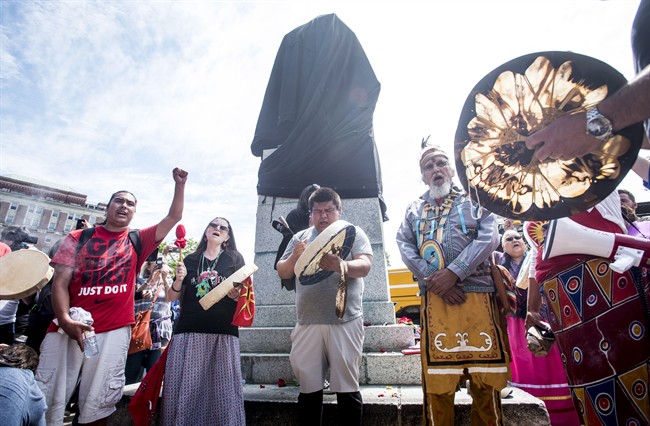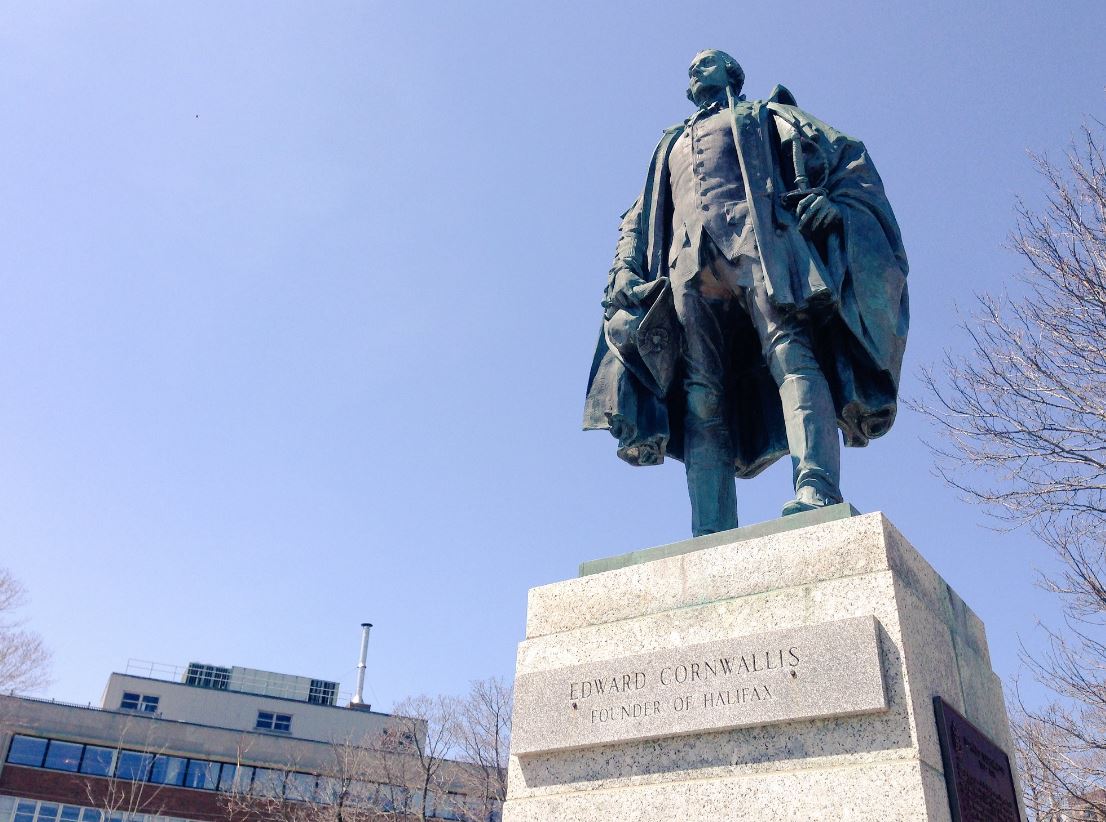Halifax Mayor Mike Savage will read a call to action from Mi’kmaq protesters who want the statue of Edward Cornwallis taken down into the record at Tuesday’s regional council meeting.

But that doesn’t mean he’ll meet the group’s demands.
“Their demands of council are very strong, and that’s why I said I can’t commit to all of these,” Savage said in an interview Monday.
Coverage of Edward Cornwallis on Globalnews.ca:
Last week, the group planned to topple the Edward Cornwallis statue. But a compromise reached with the city on Friday saw the statue instead covered by a black tarp during a protest on Saturday and then later removed.
The protest was the latest in a growing rumble of anti-Cornwallis sentiment.
The “immediate removal” of his statue in Cornwallis Park is just one of the group’s demands.
READ MORE: Protesters claim victory as controversial Halifax statue is draped in tarp
Cornwallis is celebrated as the founder of Halifax. But he is notorious for the bounty he put on the scalps of Mi’kmaq people.
Several places are named after him in Nova Scotia, including the park where his statue is located, as well as a street on the Halifax peninsula.

Get daily National news
“Having markers of genocide removed seems to be not much to ask for,” protester Tayla Paul said about her group’s requests.
READ MORE: Canadian Armed Forces apologize for members’ actions at Indigenous ceremony in Halifax
The group gave Savage their “declaration for a call to action” at Saturday’s protest
Its demands were as follows:
- “The immediate removal of the Edward Cornwallis statue as it represents a symbol of genocide and continues to prevent reconciliation with Indigenous Peoples;
- “Host a Peace Assembly to facilitate reconciliation and peace amongst all peoples; and
- “To create an Indigenous-Halifax Expert Panel comprised of representatives from the Halifax Regional Municipality and Indigenous Peoples.”
The group said the panel should “examine the naming of all public parks and other places under the control of the Halifax Regional Municipality, to ensure they are respectful of the history of Indigenous Peoples; ensure that First Nation history and Treaties are reflected in public spaces; and work together to identify other acts of reconciliation for implementation.”
Savage said many of the group’s requests are covered in work the city is already undertaking.
In April, council agreed to strike an expert panel to advise the city on any changes to how the city commemorates Cornwallis and how to recognize indigenous history in Halifax.
The panel will be struck in September but there’s no timeline yet for its work.
Another report commissioned by council last year is expected this fall; it will address how the city should implement its commitments to reconciliation.
Paul said the point of the call to action is to quicken the pace of the city’s work. And she said removing the Cornwallis statue would be a sign of good faith before the panel starts its work.
“It’s not something that’s just coming out of the blue, it’s something that we haven’t been listened to for a very long time,” she said.
“A lot of our elders aren’t receiving the type of reconciliation that needs to happen and it needs to happen at a pace that’s a lot faster than city council to really be meaningful.”
But Savage said the city needs to take its time to decide on the future of Cornwallis.
“We want to get it done quickly but we also want to get it done correctly,” he said.
READ MORE: Who are the ‘Proud Boys’ who protested an Indigenous ceremony in Halifax?
Savage said he doesn’t expect the demands from the group to be debated at council.
However, he said he will put forward a motion to ask for a staff report to look at establishing a legacy room at Halifax city hall that would be designated as a room for reconciliation. The rooms are linked to the Gord Downie and Chanie Wenjack Fund.






_848x480_1397405763961.jpg?h=360&w=540&crop=1&quality=70&strip=all)




Comments